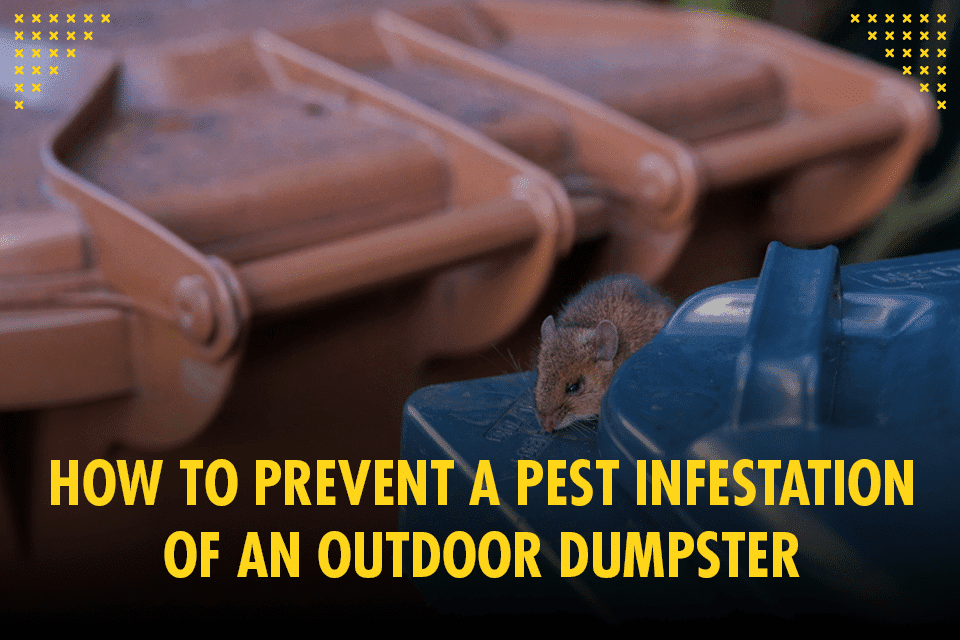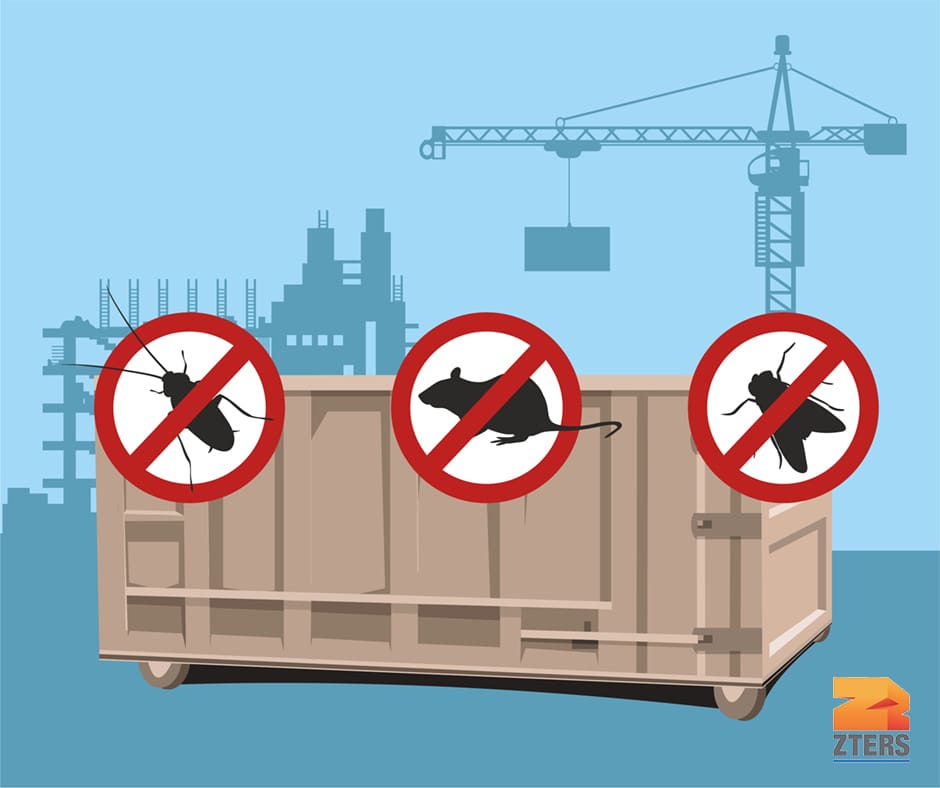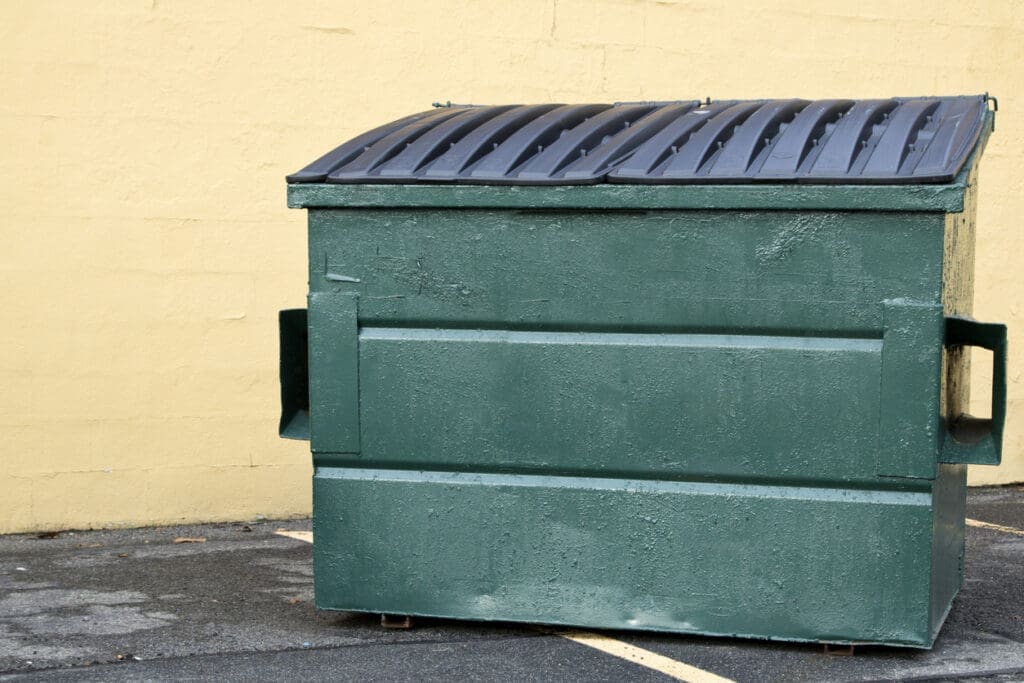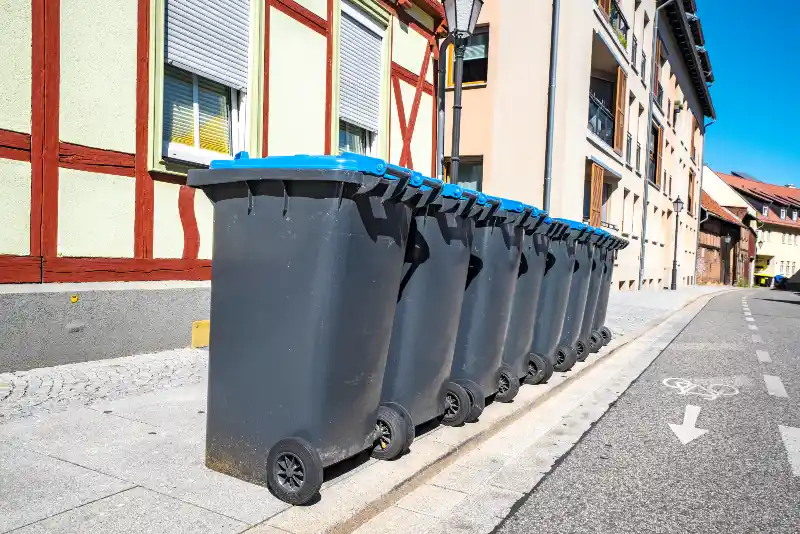Are you tired of dealing with pesky pests infesting your outdoor dumpster? Look no further! In this article, we will explore effective strategies to prevent pest infestations outdoors. From proper dumpster maintenance to implementing natural repellents, we’ve got you covered. Say goodbye to those unwanted critters and enjoy a pest-free environment. Let’s dive into the world of dumpster defense and reclaim control of your outdoor space!

Introduction
Understanding the Importance of Outdoor Pest Prevention
As you enjoy spending time outdoors, it’s crucial to consider the importance of pest prevention. Pests can easily become a nuisance and pose health risks, making it essential to take proactive measures to keep them at bay. Outdoor areas that house dumpsters are especially vulnerable to pest infestations, as these containers can attract a wide range of unwanted critters. In this article, we will discuss the role of dumpsters in attracting pests and explore effective strategies for preventing infestations.
The Role of Dumpsters in Attracting Pests
Dumpsters provide an abundant source of food and shelter for pests, making them an attractive destination for these unwanted visitors. Left unattended or improperly managed, dumpsters can become a breeding ground for insects, rodents, and other pests. Their presence near buildings and residential areas poses a significant health risk and can lead to property damage. It is crucial to address this issue by implementing strategies to minimize the attraction of pests to dumpsters.
Choosing the Right Dumpster
Opting for Dumpsters with Secure Lids
When selecting a dumpster, it is essential to choose one with secure lids. Unsecured lids allow pests easy access to the contents, increasing the likelihood of infestations. Secure lids not only prevent pests from entering but also help contain odors that attract them. This simple step will significantly reduce the number of pests attracted to the dumpster.
Considerations for Dumpster Size
The size of the dumpster also plays a crucial role in preventing pest infestations. It is important to choose a dumpster size that matches your needs without being excessively large. Overfilled dumpsters can create attractive nesting sites for pests and make it difficult to secure the lid properly. By selecting an appropriate size, you can avoid unnecessary pest issues.
Selecting Dumpsters with Pest-Resistant Materials
Dumpsters made from pest-resistant materials provide an extra layer of defense against infestations. These materials are designed to withstand the damage caused by pests, preventing them from gnawing through and accessing the contents. By investing in dumpsters made from pest-resistant materials, you can effectively deter pests and maintain a pest-free outdoor environment.

Proper Placement of Dumpsters
Keeping a Safe Distance from Buildings and Entry Points
To prevent pests from infiltrating nearby buildings, it is crucial to keep dumpsters at a safe distance. Ideally, dumpsters should be placed at least 15 to 20 feet away from structures to minimize the chances of pests finding their way inside. This distance acts as a physical barrier, discouraging pests from venturing closer to potential food and shelter.
Avoiding Obstructions and Overhangs
Dumpsters should be placed in areas free from obstructions and overhangs. Overhanging structures provide pests with easy access to the dumpster, increasing the likelihood of infestations. It is essential to ensure that there are no low-hanging branches, awnings, or other potential entry points near the dumpster. By maintaining clear surroundings, you can create a less inviting environment for pests.
Importance of Regular Dumpster Cleaning
Regular cleaning of dumpsters is vital for pest prevention. Removing any food debris, spills, or other attractants from the dumpster will minimize the incentive for pests to gather. Thoroughly cleaning the dumpster on a routine basis will help eliminate odors and potential food sources, reducing the risk of infestation. Implementing a consistent cleaning schedule will ensure that the dumpster remains unappealing to pests.
Sealing Dumpsters Effectively
Using High-Quality Seals and Gaskets
Properly sealing dumpsters is essential in preventing pests from accessing the contents. Using high-quality seals and gaskets will create a tight barrier, making it difficult for pests to find their way in. Inspecting and replacing worn-out seals and gaskets regularly is crucial to maintaining an effective seal. By investing in quality sealing materials, you can enhance pest prevention efforts.
Repairing Any Damages or Cracks
Damaged or cracked dumpsters provide easy access points for pests. It is crucial to regularly inspect the dumpsters for any signs of damage and promptly repair them. Even small cracks or holes can serve as entryways for pests, so it is essential to address these issues as soon as they are detected. By maintaining the structural integrity of the dumpsters, you can minimize the risk of infestation.
Implementing Locking Mechanisms
Installing locking mechanisms on dumpsters adds an extra layer of security against pests. These mechanisms prevent pests from lifting the lid or accessing the contents. Locks can be simple padlocks or more advanced security measures, depending on the level of protection required. Applying locks to dumpsters will significantly reduce the chances of pests gaining access, providing effective pest prevention.

Educating Staff and Residents
Informing Staff and Residents about Pest Prevention Measures
Effective pest prevention requires the cooperation of everyone involved. It is important to educate staff and residents about the importance of adhering to pest prevention measures. By informing them of the risks associated with pest infestations and the role they play in prevention, you can foster a sense of responsibility and ensure everyone is actively participating.
Training Staff on Proper Dumpster Use and Maintenance
Proper use and maintenance of dumpsters are crucial in pest prevention. Staff members should be trained on how to dispose of waste properly, ensuring that no spills or litter are left behind. Additionally, they should be educated on the significance of regular cleaning and maintenance. By providing adequate training, you empower your staff to contribute to the pest-free environment.
Implementing Regular Maintenance Practices
Establishing Routine Dumpster Inspections
Regular inspections of dumpsters are necessary to identify any signs of damage or potential infestations. These inspections should be carried out on a set schedule to ensure early detection and prompt action. During inspections, attention should be given to both the exterior and interior of the dumpster, including the lid, walls, and bottom. Detecting issues early on allows for timely repairs and prevents further pest attraction.
Prompt Removal of Dumpsters with Potential Pest Infestations
If a dumpster is found to have a potential pest infestation, it is crucial to act promptly and remove the dumpster from the area. This will prevent the pests from spreading to nearby locations and minimize the risk of further infestations. Removing the infested dumpster for appropriate pest control measures will help protect the surrounding environment.
Regular Pest Control Treatments and Repellents
In addition to regular maintenance practices, it is essential to implement pest control treatments and repellents. This includes using approved pesticides and repellents specifically designed for outdoor areas. Regularly treating dumpsters and the surrounding areas will create a deterrent effect, discouraging pests from approaching. Consulting with pest control professionals will ensure the use of safe and effective treatments.

Utilizing Natural Pest Deterrents
Planting Pest-Repelling Flowers and Herbs
Nature provides us with natural pest deterrents that can be utilized to keep pests away from dumpsters. Planting flowers and herbs that repel pests, such as marigolds, lavender, and mint, can act as a natural barrier. These plants emit scents that pests find unpleasant, effectively deterring them from the area. By incorporating these plants into the surroundings, you can enhance pest prevention efforts.
Using Essential Oils as Natural Pest Repellents
Essential oils have been proven to repel pests due to their strong scents. Citronella, eucalyptus, and peppermint oils are popular choices for naturally repelling pests. By spraying diluted solutions of these essential oils around the dumpster area, you can create an inhospitable environment for pests. It is important to reapply the oils regularly to maintain their effectiveness as a repellent.
Attracting Natural Predators to the Area
Introducing natural predators to the outdoor surroundings can help control pest populations. For example, attracting birds by providing birdhouses or birdbaths near the dumpster area can help keep insects under control. Additionally, encouraging beneficial insects such as ladybugs and lacewings can assist in naturally controlling pest populations. By creating a balanced ecosystem, you can mitigate the prevalence of pests.
Monitoring and Early Detection
Installing Surveillance Systems near Dumpsters
Installing surveillance systems near dumpsters provides the advantage of monitoring activity round the clock. This allows for the early detection of any potential pest infestations or unauthorized access to the dumpsters. Surveillance footage can be reviewed regularly and any signs of pests can be addressed promptly. By maintaining a vigilant watch, you can quickly detect and address any pest-related issues.
Using Pest Traps and Monitoring Devices
Pest traps and monitoring devices are valuable tools in pest prevention. Placing traps strategically around the dumpster area can help capture pests, providing insights into their presence and activity levels. Monitoring devices, such as motion-activated cameras or pest activity sensors, can alert you to any signs of pests. Regularly checking and resetting traps and devices will help ensure the effectiveness of your pest prevention efforts.
Prompt Reporting of Any Pest Sightings
Encouraging staff and residents to promptly report any pest sightings is essential for effective pest prevention. Quick reporting allows for immediate action to be taken, preventing the infestation from spreading. By fostering a culture of communication and accountability, you create a unified front against pests and protect the outdoor environment.

Collaborating with Pest Control Professionals
Hiring Professional Pest Control Services
To ensure comprehensive pest prevention, it is recommended to seek the expertise of professional pest control services. These professionals have the knowledge and experience to identify potential risks and implement effective control measures. By entrusting your pest prevention efforts to experts, you can benefit from their specialized techniques and ensure a pest-free outdoor environment.
Scheduling Regular Pest Control Inspections
Regular pest control inspections are crucial in detecting and addressing any emerging pest issues. Pest control professionals can conduct thorough inspections, identifying potential vulnerabilities and implementing appropriate prevention strategies. By scheduling regular inspections, you can stay one step ahead of pests and maintain a clean and healthy surrounding.
Seeking Expert Advice on Pest Prevention
Consulting with pest control professionals allows you to gain valuable insights and expert advice on pest prevention. They can provide tailored solutions and recommend specific products or techniques to enhance your pest prevention efforts. By leveraging their knowledge, you can optimize your outdoor pest control strategies and create a more effective defense against infestations.
Conclusion
Creating a Pest-Free Outdoor Environment
Preventing pest infestations in outdoor areas is essential for ensuring a clean and healthy environment. By understanding the role of dumpsters in attracting pests and implementing effective prevention strategies, you can significantly reduce the risk of infestations. Opting for dumpsters with secure lids, proper placement, and regular maintenance are key factors in pest prevention. Utilizing natural deterrents, monitoring for early detection, and collaborating with pest control professionals further enhance your defenses. By employing these measures, you can create a pest-free outdoor environment that promotes safety, cleanliness, and overall well-being.

I am Randy, the author behind PestControld.com. Drawing from decades of experience, I aim to provide valuable insights, expert advice, and practical recommendations to help you make informed decisions when assessing viable pest control solutions.